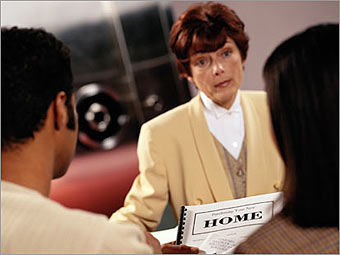The charge: Brokers steered borrowers to loans they couldn't afford.
The huge increase in mortgage originations, including a spike in refinancings, during the first half of the 2000s, attracted a flood of new mortgage brokers into the industry. Despite a lack of experience, many were soon earning six-figure incomes.
When business slowed near the end of 2005, brokers had to find new ways to churn out deals.
"Clients started to get harder to come by and the brokers started shaking the trees a little harder," says Allen Hardester, director of business development for mortgage broker Guaranteed Rate. Some very poor risks who would have been blown off during better times, got loans.
Critics also charge that many borrowers, especially minorities, whose credit scores qualified them for prime loans ended up in the subprime category.
Years of out-sized home price increases delayed the day of reckoning but when markets stopped their run-up in 2006, it left many borrowers unable to make payments. And the more recent the loan, the more tenuous is seems to be.
"Subprime 2006 loan originations are going delinquent much more quickly," said Bob Visini, vice president of marketing for First American LoanPerformance. But mortgage brokers have come in for an unfair amount of criticism, according to Harry Dinham, president of the National Association of Mortgage Brokers .
"It's the lender's money," he says. "They're reviewing the loans. They put loan programs out there and it's the mortgage broker's job to sell the programs."
Bottom line: Were mortgage brokers always careful about matching borrowers with affordable mortgages? No way. But lenders made the ultimate underwriting decision.
javascript:window.top.controller.userSave();SAVE | Now more than ever it pays to be a prime borrower - here's how to be that guy. (more) Housing activists say families that have mortgages with questionable terms should be given six months to work out deals. (more) |

